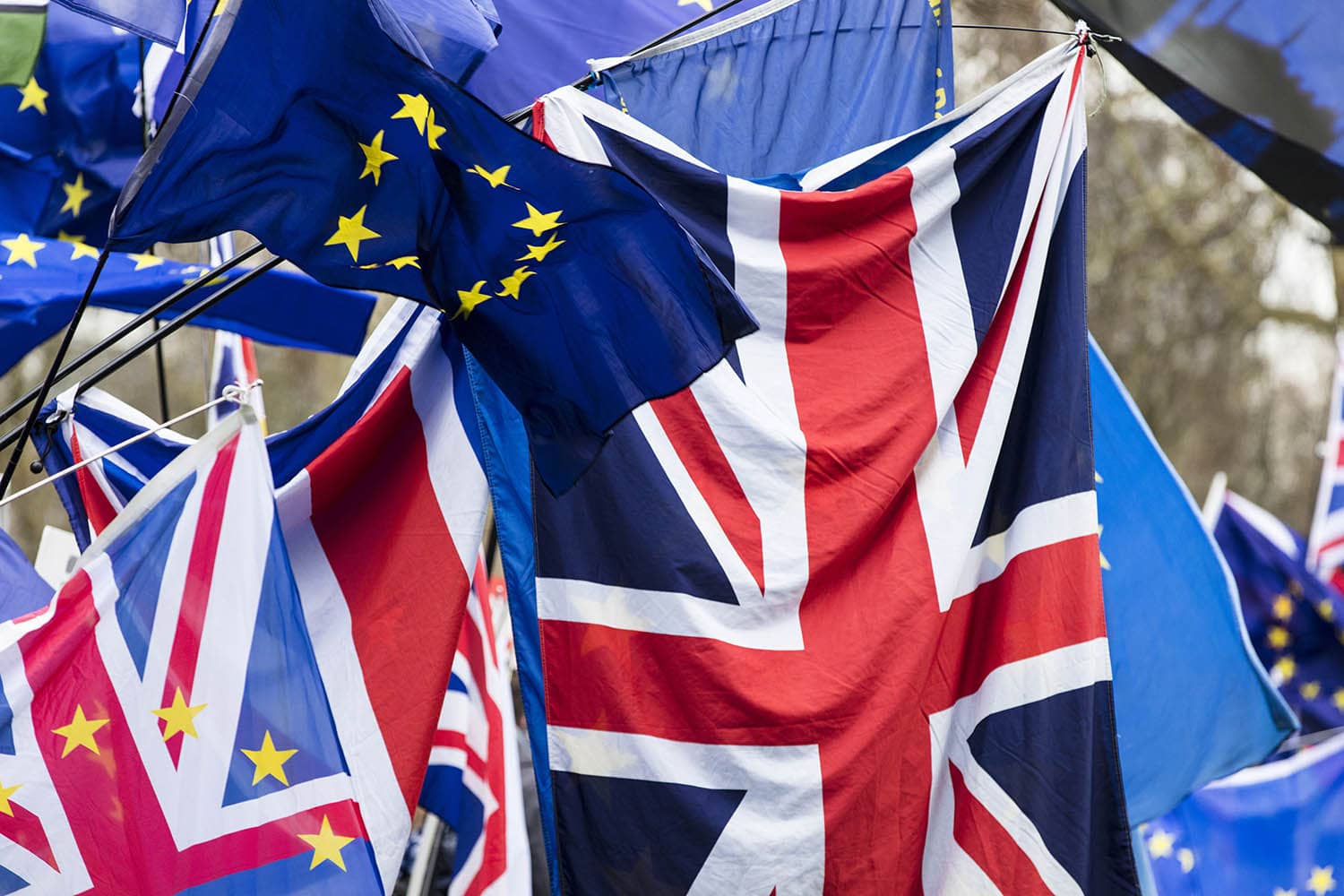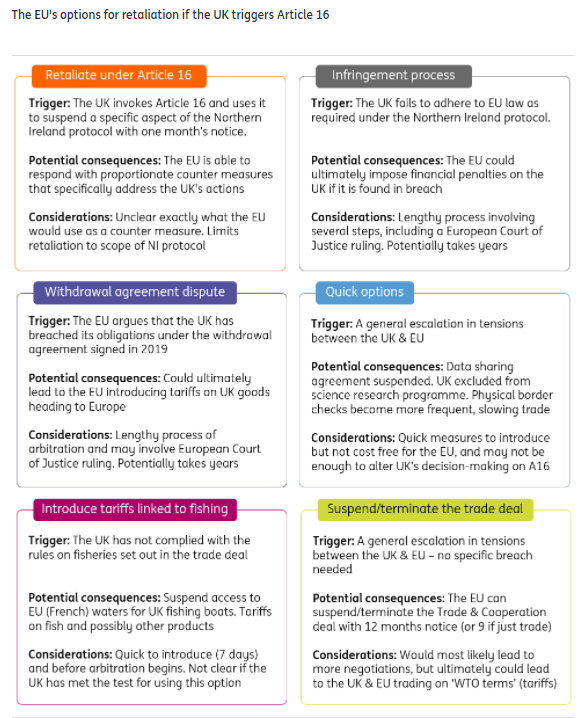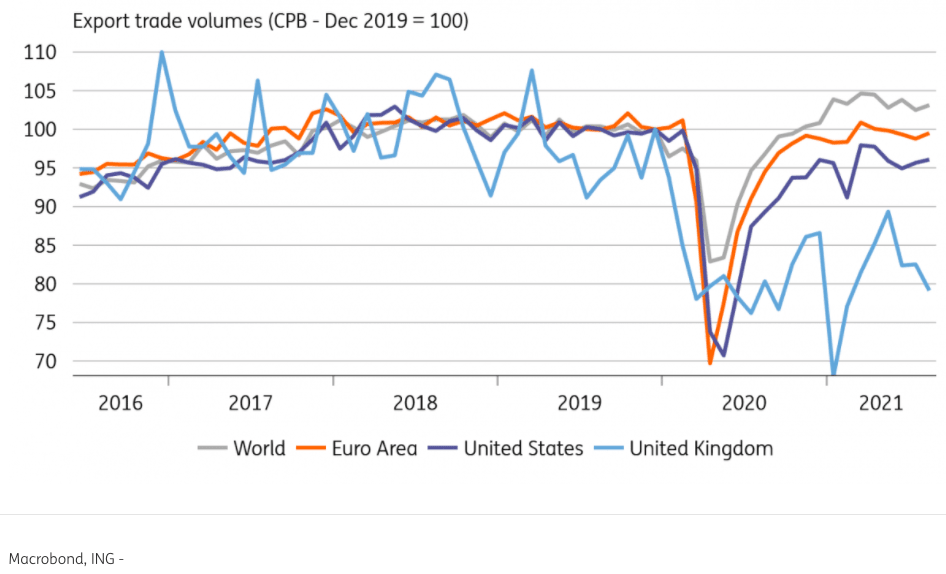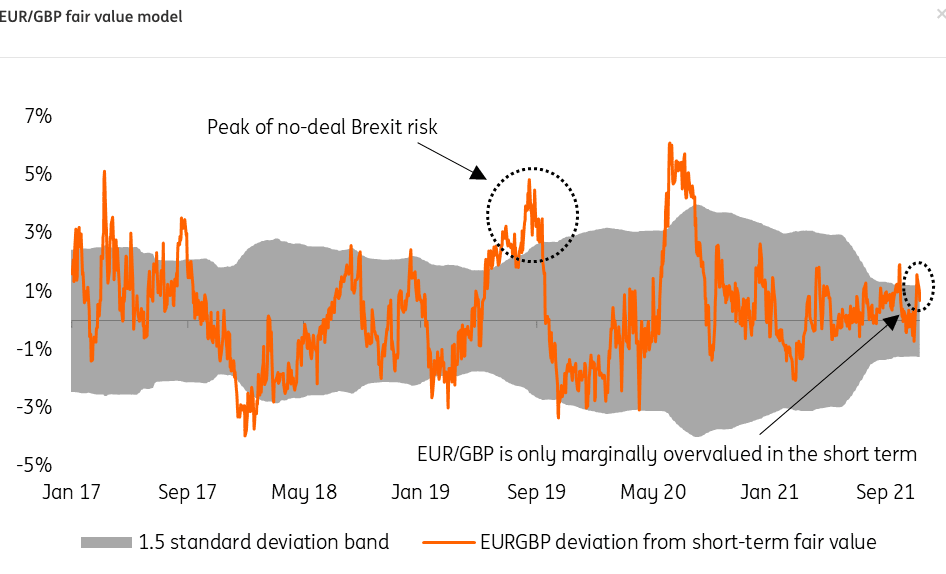Brexit's Back, But Impact on Pound Sterling Could be Limited says ING
- Written by: Gary Howes
"There's growing talk of the EU suspending its trade deal with the UK. But fresh Brexit uncertainty may not have as big a market impact as perhaps presumed" - ING.

Image © Adobe Images
An increasingly common theme landing on our editorial desk is the view that the British Pound will come under pressure if the UK triggers Article 16 of the Northern Ireland protocol.
The theory is a familiar one: rising Brexit anxieties tend to manifest most rapidly and obviously in the value of the UK currency and the triggering of Article 16 poses fresh questions about the future of EU-UK relations.
Such a move by the UK would come in response to the impasse in talks aimed at rectifying problems with the protocol, but such a unilateral move could see the EU impose trade tariffs, or even walk away from the free trade agreement entirely.
Brexit is back and for foreign exchange markets the question is to what extent it will impact the Pound.
"Sterling may suffer if the European Union wields a big stick against Britain in the event that London escalates a dispute over trading arrangements for Northern Ireland by triggering an article that would suspend part of its Brexit deal," says Robert Howard, a market analyst at Reuters.
Howard's is the more typical assumption posed by analysts, but from one multinational bank comes a surprising view: that much of the negative impacts of Brexit are already 'in the price' of the Pound and therefore there is a risk of overplaying the issue.
James Smith and Chris Turner at ING Bank N.V. in London say that the free trade deal agreed last year was "only one notch up from not having a deal at all", therefore the economic impact of further escalation is more limited.
The findings form part of a research note that comes as the Northern Ireland issue grows in importance with EU and UK negotiators hold talks again in London on Friday, with post-talk updates likely to provide some interest for markets.
No progress is expected and there are reports the UK is readying to trigger Article 16 by the end of November.
- Reference rates at publication:
GBP-EUR: 1.1683 \ GBP-USD: 1.3370 - High street bank rates (indicative): 1.1450 \ 1.3090
- Payment specialist rates (indicative: 1.1625 \ 1.3304
- Find out about specialist rates, here
- Or, set up an exchange rate alert, here
The EU will likely impose countermeasures on such a move by the UK and some analysts warn this bust-up could push the Pound lower.
News media report of the potential for a trade war between the UK and EU as being an end result of the triggering of Article 16 while prominent Irish politicians have been keen to telegraph the prospect of substantial countermeasures.
"There's growing talk of the EU suspending its trade deal with the UK, should the British government make unilateral wholesale changes to the Northern Ireland protocol. That would revive the risk of a 'no deal' scenario, but fresh Brexit uncertainty may actually not have as big a market impact as perhaps presumed," says ING's Smith.
He says what ultimately matters is how far the EU decides to retaliate against any UK action. "And that initially depends on exactly how much of the Northern Ireland protocol the UK government seeks to suspend."
Smith finds that a narrow move by the UK to rectify a specific issue – perhaps aimed at making life easier for supermarkets bringing products from the British mainland into Northern Ireland – need not provoke a "nuclear response" from the EU.
He points out that the protocol stipulates while the EU could take retaliatory measures they should be "proportionate" and "strictly necessary".
Secure a retail exchange rate that is between 3-5% stronger than offered by leading banks, learn more.
But a worst case scenario where the trade agreement is suspended entirely cannot be ruled out, particularly if the UK suspends significant amounts of the protocol relating to the oversight of the European Court of Justice.
"Needless to say, if this were to happen, we’re back into the realms of ‘no deal’ and so-called ‘WTO terms’," says Smith. "But there are a few reasons why the return of Brexit may not be dramatic for sterling."
The suspension of the deal would involve a period of notice within which further negotiations would occur.
There is no 'hard deadline' to the current talks and therefore little incentive to really get the two sides to compromise: they are famous for only reaching agreements in the final hour.
But more crucially ING estimates the economic hit if there were to be an abrupt end to the trade deal may not be "gigantic".
ING finds that the form filling under the current regime is already substantial and this is because avoiding tariffs requires firms to prove goods have sufficient EU or UK components.
"In some instances where tariffs are low, it may already simply be easier to pay a tariff than document a supply chain," says Smith.
Above: Exports to the EU have already suffered a sizeable hit. Image courtesy of ING.
{wbamp-hide start}
{wbamp-hide end}{wbamp-show start}{wbamp-show end}
"In short, the effect of leaving the single market and customs union at the end of 2020 was the major sea change in trade terms. The additional economic effect of reverting to ‘no deal’ on top of that may not be as considerable as perhaps supposed," says Smith.
With regards to the all-important impact an ending of the trade deal might have on the Bank of England, ING find it will be relatively small.
"The situation in the jobs market, and establishing how widespread labour shortages are, will be far the biggest determinants of what the Bank does," says Smith.
What does this mean for the Pound?
Smith's colleague at ING Chris Turner - who heads the bank's FX strategy team - says an increased layer of uncertainty and the reintroduction of a negative economic tail risk is bad news for UK markets.
But, "reports of sterling's demise feel a little exaggerated to us," says Turner.
Institutional analysts are yet to report any major 'Brexit premium' being obvious in Sterling exchange rates, with ING estimating that the discount was as high as 5.0% during the years of tortuous negotiations.
"This year, that risk premium in the GBP has seemed quite contained - at about 1%," says Turner. "We suspect the impact on GBP is more muted this time around."
Above: ING's model for assessing how much premium Brexit is posing to GBP. Image courtesy of ING.
With the Bank of England set to tighten policy soon, ING "are happy with an end-year EUR/GBP target near 0.8500, and lower levels as 2022 progresses."
EUR/GBP at 0.85 gives a Pound to Euro exchange rate of 1.1765, which is not far from current levels in spot.








